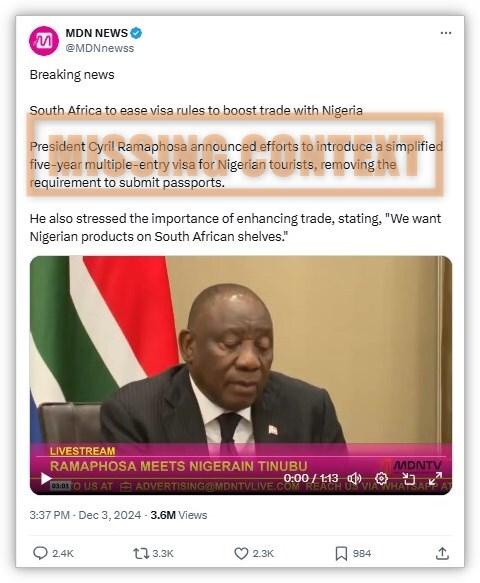How South African Current Events can Save You Time, Stress, and Money.
South African Current Events Can Be Fun For Anyone
Table of ContentsThe Best Guide To South African Current EventsGetting The South African Current Events To WorkThe smart Trick of South African Current Events That Nobody is Talking AboutSouth African Current Events for BeginnersSouth African Current Events Fundamentals Explained
The Limpopo Mirror is published in Louis Trichardt, a town in the north of South Africa's Limpopo district. Picture: Anton van Zyl Today the Competitors Compensation is probing exactly how on the internet information is influenced by AI chatbots, search and advertising technology. The result of the hearings is crucial for the future of information coverage in South Africa.
Registrations and sales of individual copies were typically implied to cover this, but the actual cash was advertising - and for some magazines, like the Cape Argus in Cape Community, the classifieds. South African current events. The advertisers sponsored the information, whether in a nationwide everyday, or a small weekly newspaper dispersed in a rural town
In the areas this income paid for the press reporter to go to the regular monthly council meeting, cover college occasions and see the court to discover that might have finished up on the wrong side of the law. Consider instance the Limpopo Mirror, a regular newspaper released in Louis Trichardt which among us, Anton, owns.
The cost of printing was about 15% to 20% of our turnover. The advertisement loading (the percentage of space committed to advertising and marketing as opposed to news) was between 50% and 60%.
South African Current Events Can Be Fun For Anyone
The decrease in advertising causes less web pages in the newspaper, and much less room for information articles. As the internet came to be significantly popular, newspapers started releasing their stories on-line, typically cost-free. Limpopo Mirror was among the very first newspapers in the nation to release a web site with regular information updates.
In the beginning many of us were driven by trial and error and the thrill to be early adopters so we didn't shed out to the competitors. However there was no viable service design. Adverts were rare and it took a while before this became the primary way individuals read their information.
Some Known Questions About South African Current Events.
It was hassle-free, instant and usually complimentary, specifically as the cost of information dropped. At the very same time, purchases of published newspapers started to decrease. A few instances: In 2006 the Sunday Times was the most significant weekend break paper in South Africa, with an audited flow of simply over half a million copies.
This consisted of greater than 11,000 digital duplicates. The Daily Sunlight was as soon as the greatest marketing daily, and in the last quarter of 2007 boasted a flow of over 513,000 duplicates. Last year it dropped to listed below 13,000 sold copies and transformed its circulation method. This has been the fad for many long-running newspapers in the world.
However the freesheet version does not function well in casual negotiations or country areas. To successfully get to viewers in these locations, it's also costly to deliver door-to-door. Bulk drops of newspapers have to be dropped off at shopping centres, for example, and waste of these is high. This suggests you need to publish bigger amounts to get to the very same variety of individuals and this is not financially sensible.
To produce a paper has actually ended up being extremely pricey, which indicates marketing tariffs have had to increase. To go was the classified areas of newspapers.
Not known Details About South African Current Events
While this was all occurring, papers such as website here the Limpopo Mirror attempted to keep up. Print blood circulation went down to around the 4,000 mark, the readers did not relocate away.
The difficulty was to transform that audience into a profits version that would pay for high quality journalism. In South Africa, unlike a few other parts of the globe, there is not a culture of paying for news. South African current events. Membership versions gave some services in Europe, however right here it is presently anchor not a sensible alternative.
Social media maintains reporters on their toes. Though there is no information to verify this, it appears to us that blunders are spotted more quickly, and underhanded practices caught with better vigour nowadays. The affordable of access has actually likewise permitted brand-new sorts of news magazines to begin, like GroundUp, which Nathan edits.
Getting My South African Current Events To Work
Why is advertising not working for news publications? Advertising and marketing visit our website income has actually been damaged mostly by Google Advertisements and social media adverts.
BNN is a news publisher. Here's how they describe themselves: "Our dedication is to supply sincere, fact-based, and objective international reporting that can be trusted. We strive to assist people deal with the issues that matter most in their lives. We are the trailblazers, the guardians, and the truth-seekers." Their newspaper article continually rate extremely on Google Information searches.

Days after Anton's story was released we both looked "Vhembe" (the region where Anton reports from) on Google Information. The BNN variation of the tale regularly appeared near the top of the search results. The real variation didn't. This is however one example. Often BNN information tales, plagiarised and relatively rewritten by ChatGPT or some various other AI chatbot, show up higher in Google search than their genuine equivalents.
Two various Google products drive this scam: Google Browse drives viewers to BNN; Google Ads gives the incentive for BNN's parasitic organization model. Far in 2024, 72% of GroundUp's website traffic has come to our site using search engines.